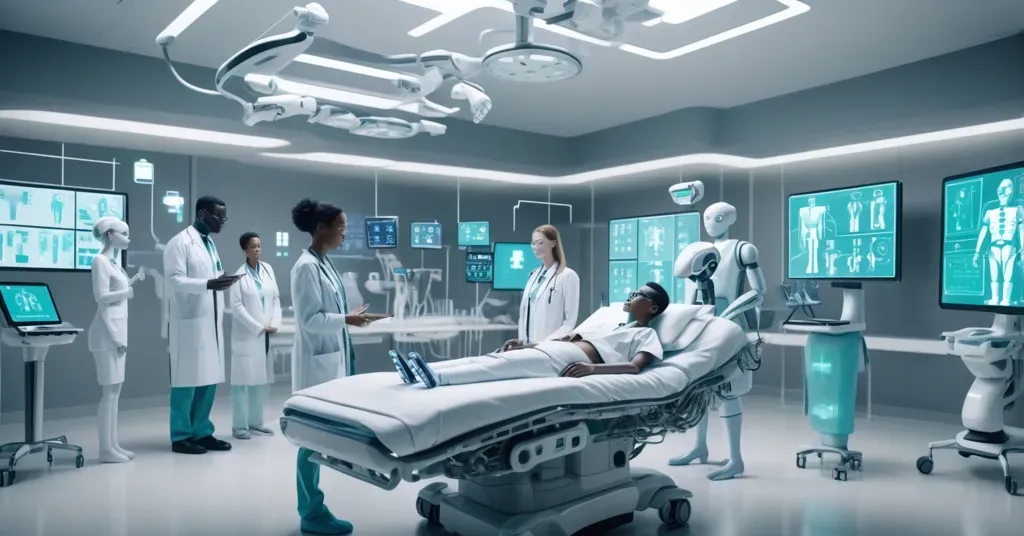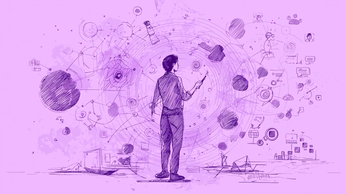
Healthcare 2025: Trends, Challenges, and Transformative Growth
AI is set to revolutionize healthcare by 2025, slashing drug development time by 50% and enhancing patient care through automation and personalized treatments.
This decade, AI could reduce drug development time by 50%, revolutionizing healthcare as we know it. The integration of artificial intelligence (AI) and machine learning (ML) is not just a trend—it's a transformation that promises to enhance diagnostics, drug development, and patient care. Let's delve into how these technologies are reshaping healthcare, the challenges they present, and the future they herald.
AI in Drug Development
In pharmaceutical research, AI and ML are changing the game. Imagine a chef experimenting with recipes in a virtual kitchen before cooking a real meal. That's what AI does in drug development through molecule modeling and simulating chemical reactions. By predicting how different drugs will work, AI significantly reduces the need for costly physical experiments, speeding up scientific breakthroughs and bringing new drugs to market faster. The latest advancements in AI molecule modeling are key to this progress.
As TATEEDA GLOBAL suggests, the future of pharmaceuticals lies in leveraging these advanced technologies to streamline research processes. The ability to conduct virtual experiments not only accelerates drug discovery but also enhances patient outcomes by 30% to 40% and reduces treatment costs by 50%, according to Frost and Sullivan. For more on healthcare technology trends, explore further insights.
AI and Hospital Automation
How can AI help address the staffing shortages in healthcare? The answer lies in AI-driven robotics and Virtual Health Assistants. Post-COVID-19, healthcare systems are facing a shortage of nurses and clinicians. By 2025, startups are expected to invest hundreds of millions in AI projects designed to reduce staffing costs through robotics. These systems aim to augment, not replace, human medical professionals, supporting them in delivering high-quality care. Discussions on AI hospital automation challenges provide deeper insight into this topic.
Moreover, AI-powered chatbots are evolving into Virtual Health Assistants, enhancing patient engagement and handling administrative tasks. These assistants provide comprehensive healthcare support, from scheduling appointments to offering personalized health advice, thereby improving operational efficiency.
Challenges and Ethical Considerations
The adoption of AI in healthcare is not without its challenges. Regulatory bodies like the U.S. FDA, Health Canada, and the UK’s MHRA have introduced guidelines for Good Machine Learning Practice (GMLP) to ensure the safe implementation of AI in medical devices. These FDA guidelines are crucial for maintaining the integrity and safety of AI applications in healthcare.
Cybersecurity also poses a significant threat. As healthcare systems become more digitized, they are increasingly vulnerable to cyberattacks. AI applications are being used by hackers to target healthcare systems, necessitating robust data breach prevention measures. The International Hospital Federation (IHF) report emphasizes the critical need for cybersecurity in healthcare, given the sector's increased vulnerability to cyber threats.
Future Trends and Personalized Healthcare
By 2025, personalized healthcare will extend beyond precision medicine to include tailored wellness and communication strategies. AI's power lies in its ability to analyze vast amounts of data to address every aspect of a patient's unique needs. As Bernard Marr notes, "Personalized healthcare means more than just precision medicine – it’s about tapping into the power of AI and data to address every aspect of a patient’s unique needs." Explore more on AI and personalized healthcare trends by 2025.
Emerging technologies like VR/AR, brain-computer interfaces (BCIs), and genomic technologies like CRISPR are set to revolutionize healthcare. VR/AR can enhance mental healthcare delivery, while BCIs offer new hope for managing chronic pain, epilepsy, and paralysis. Genomic technologies are advancing into clinical applications, targeting genetic conditions such as cystic fibrosis and Huntington’s disease. For a comprehensive view, see healthcare innovations transforming 2025.
However, the explosion in health data poses both opportunities and risks. Healthcare is the sector most heavily impacted by data breaches, as reported by the World Economic Forum (WEF). Ensuring data privacy and security will be paramount as we move towards a more personalized healthcare model. Learn about cybersecurity risks in healthcare AI to understand these challenges better.
Regional Focus: Canadian Healthcare in 2025
In Canada, healthcare faces unique challenges by 2025. With 3 in 4 Canadians believing limited access to healthcare is a threat to their health, and over 1 in 5 lacking a regular family doctor or nurse practitioner, the urgency for action is clear. AI's integration into diagnostics and patient care pathways offers transformative potential but brings ethical and privacy concerns. For a detailed perspective, see the road ahead.
The mental health crisis, with 21.2% of employed Canadians experiencing high or very high work-related stress, underscores the need for comprehensive solutions. Indigenous communities face significant health disparities, and climate change is projected to cost Canada's healthcare system billions without adaptation efforts. A focus on preventative care, addressing lifestyle and behavioral changes, is becoming more critical.
Global Health Systems and Digital Transformation
Global health systems are prioritizing digital transformation to improve operational efficiencies and productivity. According to a Deloitte US Center for Health Solutions survey, over 70% of surveyed C-suite health executives aim to enhance efficiencies by 2025, with 70% planning to invest in digital tools and services. Delve into the 2025 outlook for digital transformation in global health systems.
Generative AI is being explored for administrative automation, with 80% of executives expecting it to have a significant or moderate impact. The global healthcare workforce shortage, projected to reach 10 million workers by 2030, necessitates innovative solutions like digital tools to reduce administrative burdens, freeing up to 20% of nurses' time for patient care. Enhancing consumer experience, engagement, and trust is a priority for 72% of executives, reflecting the need for a patient-centric approach.
Key Takeaways and Questions
- How are AI and ML transforming pharmaceutical research and diagnostics?
AI and ML revolutionize pharmaceutical research by enhancing molecule modeling and simulating chemical reactions, speeding up scientific breakthroughs and reducing the need for costly physical experiments.
- What are the potential applications of AI in hospital automation and patient engagement?
AI-driven robotics and Virtual Health Assistants can augment hospital operations by reducing staffing costs and enhancing patient engagement through comprehensive support and administrative efficiency.
- How will healthcare systems balance the integration of AI with maintaining the welfare of medical professionals?
Healthcare systems must ensure that AI technologies are used to support, not replace, medical professionals, by focusing on augmenting their capabilities and reducing administrative burdens.
- What measures can be taken to mitigate the cybersecurity risks posed by AI-enhanced hacking?
Robust cybersecurity measures, including encryption, regular security audits, and adherence to regulatory guidelines like GMLP, are essential to protect healthcare systems from AI-enhanced hacking threats.
- What are the significant healthcare technology trends by 2025?
Key trends include AI and ML integration, personalized healthcare, generative AI marketplaces, SLMs for low-resource regions, and challenges faced by wearables and hardware developers. For a comprehensive list, see top healthcare technology trends.
- How is AI being integrated into medical teams?
AI is becoming a core component of medical teams, working alongside patients and healthcare professionals to enhance diagnostics, treatment planning, and patient care pathways.
- How can companies overcome the challenges faced by expensive hardware development in healthcare?
Companies can focus on developing scalable, cost-effective digital solutions and leveraging partnerships to share development costs and risks.
- What role will SLMs play in bringing AI to underserved regions?
SLMs, with their ability to run on mobile devices without internet access, can democratize AI access, bringing advanced healthcare solutions to low-resource regions.
- What are the major challenges facing Canadian healthcare in 2025?
Challenges include limited healthcare access, the family doctor crisis, AI integration with ethical considerations, mental health issues, health inequities, climate change impacts, and the need for preventative care.
- How is AI impacting healthcare, and what ethical considerations must be addressed?
AI is transforming diagnostics and patient care but raises ethical concerns around data privacy, security, and the potential for bias in AI algorithms. For more on this, visit ethical considerations in AI healthcare.
- What specific actions can political leaders take to address the family doctor crisis and mental health challenges?
Political leaders can invest in training and recruitment programs for family doctors and allocate resources for mental health initiatives to improve access and support.
- How can healthcare systems adapt to mitigate the impacts of climate change?
Healthcare systems can implement sustainable practices, invest in climate-resilient infrastructure, and develop strategies to address climate-related health issues.
- What are the priorities for health system leaders in 2025 according to the Deloitte survey?
Priorities include improving operational efficiencies, investing in digital tools and services, and enhancing patient experience, engagement, and trust.
- How is generative AI expected to impact healthcare operations?
Generative AI is expected to automate administrative processes, significantly enhancing operational efficiencies and allowing healthcare professionals to focus more on patient care.
- How can health systems effectively address the global workforce shortage?
Health systems can address the workforce shortage by leveraging digital tools to reduce administrative burdens, investing in training programs, and forming partnerships with the tech sector to bridge the skills gap.
- What strategies can be implemented to ensure robust cybersecurity in the era of digital transformation?
Strategies include implementing advanced encryption, conducting regular security audits, and adhering to regulatory guidelines to protect healthcare systems from cyber threats.
- What are the key trends shaping digital healthcare by 2025?
Key trends include AI and ML integration, telemedicine, remote patient monitoring, big data and analytics, wearable technology, and a focus on cybersecurity.
- How are AI and telemedicine enhancing healthcare accessibility?
AI enhances diagnostics and personalized care, while telemedicine and remote monitoring improve access to healthcare services, particularly in underserved areas.
- What specific measures can healthcare providers implement to bolster cybersecurity in the face of increased digitalization?
Healthcare providers can implement measures such as multi-factor authentication, regular cybersecurity training for staff, and advanced threat detection systems to bolster cybersecurity.
By embracing the principles of Exponential Organizations (ExO), healthcare professionals can leverage these technologies for transformative growth. Implementing AI and digital tools within your organization can enhance productivity and patient care. Staying informed about regulatory changes and ethical considerations is crucial for the responsible use of these new technologies.
For those keen on staying ahead of the curve, our daily health tech news feed at https://openexo.com/feed/health-tech is an invaluable resource.
The future of healthcare is not just about adopting new technologies but about rethinking how we approach care delivery. By 2025, the integration of AI and exponential technologies will not only transform healthcare but also empower individuals to take control of their health in unprecedented ways.
ExO Insight Newsletter
Join the newsletter to receive the latest updates in your inbox.









